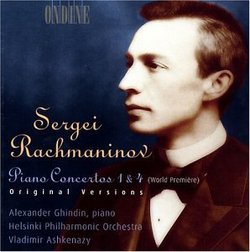| All Artists: Alexander Ghindin Title: Rachmaninov: Piano Concertos 1 & 4 (Original Versions) Members Wishing: 0 Total Copies: 0 Label: Ondine Release Date: 9/25/2001 Genre: Classical Styles: Chamber Music, Forms & Genres, Concertos, Historical Periods, Classical (c.1770-1830), Instruments, Keyboard Number of Discs: 1 SwapaCD Credits: 1 UPC: 761195097724 |
Search - Alexander Ghindin :: Rachmaninov: Piano Concertos 1 & 4 (Original Versions)
 | Alexander Ghindin Rachmaninov: Piano Concertos 1 & 4 (Original Versions) Genre: Classical
|
Larger Image |
CD DetailsSimilar CDs |
CD ReviewsThere's more to Rachmaninov than meets the eye! Paul MacNamara | Hertfordshire, England | 05/27/2002 (5 out of 5 stars) "I'll bet there are thousands of collectors satisfied that they know Rachmaninov's 1st and 4th concertos inside out. For all of them, and many others, this Ondine recording will be a revelation, and it must rank as the most important contribution to Rachmaninov's recorded legacy in a very long time. The differences between what we hear anew and what we know well are too many to list. More, the shape, mood and effect of both concertos, and in particular the 4th, will never be the same again. Yes, the composer's earliest thoughts may have been naive from time to time, he himself stated that the third movement of the 4th concerto was too long (a mere thirteen minutes!), and it may be that he was right to make many changes. But let me tell you this: if, when I pass away, I ever have the chance to meet the great man in an after-life, I shall long to hear from him why so much of the 4th concerto was discarded, why we were robbed of so much magical invention, and why he did not stick with his first instincts. Performances are genuine rather than scholarly, a fine young Russian pianist expertly supported by a vigorous Ashkenazy, the whole ably captured in a fine Finnish recording. Buy it while you can: the Rach 1 and 4 will never be the same again." Going Back To The Originals D. A Wend | Buffalo Grove, IL USA | 11/05/2001 (4 out of 5 stars) "For several years, the only recording I heard of Rachmaninov's Second Symphony was conducted by Eugene Ormandy. I had no idea that this was a version that included several cuts that Rachmaniov had sanctioned at Ormandy's insistence. Hearing the uncut Second Symphony was a revelation.The original versions of the First and Fourth Piano Concertos, recorded by Alexander Ghindin and conducted by Vladimir Ashkenazy did not provoke a similar response for me but the experience of hearing the original versions of these works makes interesting listening. The concertos are well played and recorded. Overall, I would say the revised versions of these concertos stand up better, particularly the first concerto. The original first sounds like a searching to find a musical identity with many different influences that Rachmaninov translates into his own musical style. The original Fourth is highly interesting and many of the musical ideas that were cut do deserve hearing. In some cases, I think the music should have remained but in others I think Rachmaninov was wise to make the cut.The First and Fourth concertos are not the most popular of Rachmaninov's works in that form. I tend to like the Fourth much more than some people as a refreshing alternative to the more popular Second and Third. I would recommend this disc to listeners who have a love of Rachmanov's music and are curious to experience his first musical thoughts for this pair of concertos." Rough Cut Rachmaninoff brent taylor | Indianapolis, Indiana | 04/19/2002 (4 out of 5 stars) "This is not a recording for everyone. This is more for the serious collector and Rachmaninoff enthusiast. Indeed, one might question whether it is at all worthwhile to "go back to the originals" when Rachmaninoff left such good final versions of both works. I would feel sorry for a novice might buy this recording without knowing what they were getting, especially when there are so many fine versions of these concertos out there. However, for the diehard Rachmaninoff fan, this is essential.Rachmaninoff was his own harshest critic. He frequently sanctioned cuts in major works, most notably in the third piano concerto. He also revised many of his early works, making minor changes, although his drastic reworking of the second piano sonata did not seem to satisfy anyone. Unfotunately the only merit in these originals is to learn how Rachmaninoff evolved as a composer. They are in no way superior to the final finished product. They are however very interesting to compare, particularly since one is a very early work and the other a late one.In the First Piano Concerto, the relationship with Grieg's A-minor Concerto has never been more apparent. Rachamninoff ingeniously uses Grieg's model as a vehicle for his own musical ideas (and at time comes dangerously close to borrowing more than a few of Grieg's!). What is more interesting, apart from weak and awkward orchestration is that we hear a different Rachmaninoff from the one we have come to know. There is an emotional vulnerablity and youthful exhuberance here which later gave way to a more world-weary melancholy.In the Fourth Concerto there are numerous variations in orchestration; Rachmaninoff was still improving on this when he made his own recording. What is truly astonishing here is the ending of the concerto. It creates a whole different mood than the one we have come to know and it almost seems out of charater for Rachmaninoff, which is perhaps why he ultimately discarded it.Like the youthful picture on the album cover, this is Rachmaninoff unlike we have seen him before. Well recorded and a nice collaboration between Ghindin and Ashkenazy. For the serious student only. Ashkenazy's series with himself as soloist is still hard to beat as is Michelangelli's defintive version of the fourth."
|

 Track Listings (6) - Disc #1
Track Listings (6) - Disc #1
